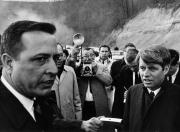RFK in EKY: The Robert F. Kennedy Performance Project
RFK in EKY, The Robert F. Kennedy Performance Project, was a series of public conversations and activities centered around the real-time, site-specific intermedia performance that recreated, on September 9 and 10, 2004, Robert Kennedy’s two-day 200-mile “poverty tour” of southeastern Kentucky in 1968. The project is partnering with Head Start to organize dialogues about the impact of drugs in Eastern Kentucky as well as developing in-depth documentation of the 2004 RFK Performance Project. Ultimately RFK in EKY hopes to generate a complete documentary film on the project and a book. Just as important, the project plans to share focused documentation with the many libraries and schools that have supported the process, and with each community partner. The project provided an opportunity to revisit the essential and still pertinent questions raised in Kennedy's original visit regarding: the representation of marginalized populations in the national consciousness; the role of government in maintaining a quality-of-life safety net, and fostering sustainable economic development, educational and vocational advancement; ways to stem the out-migration of rural young people and the loss of natural resources; and the priorities of a government administration engaged in a protracted war. RFK in EKY, like Kennedy and those who created his tour, recognizes these questions are part of an important national dialogue for which Appalachia is only one of many possible settings. Like the original tour, RFK in EKY focuses attention on the indigenous expertise and alternative visions of Appalachia. The performance re-enacted, with an all-local cast (of hundreds), the most significant events of Kennedy’s 1968 visit in order to hold an historical mirror to present day issues and ideas. The 48-hour performance recreated all aspects of Kennedy’s tour, including two official hearings of the Senate Subcommittee on Employment, Manpower and Poverty (held at Vortex and Fleming-Neon), roadside visits with individual families, walking tours of small communities and strip mine sites, stops at one-room schoolhouses, and speeches at courthouses and colleges. A series of contextualizing activities took place preceding the recreation, and surrounded the two-day performance itself. They will continue, in new forms, as the project evolves. These events range from the analytical to the deeply personal and use art as the occasion for creating public meeting space in rural communities. This profile courtesy of Arts & Democracy.
